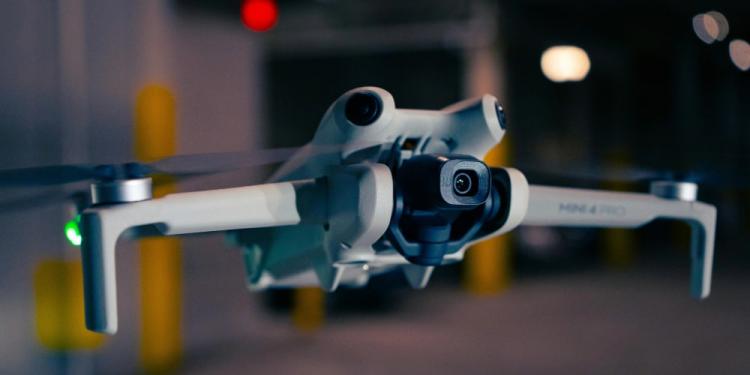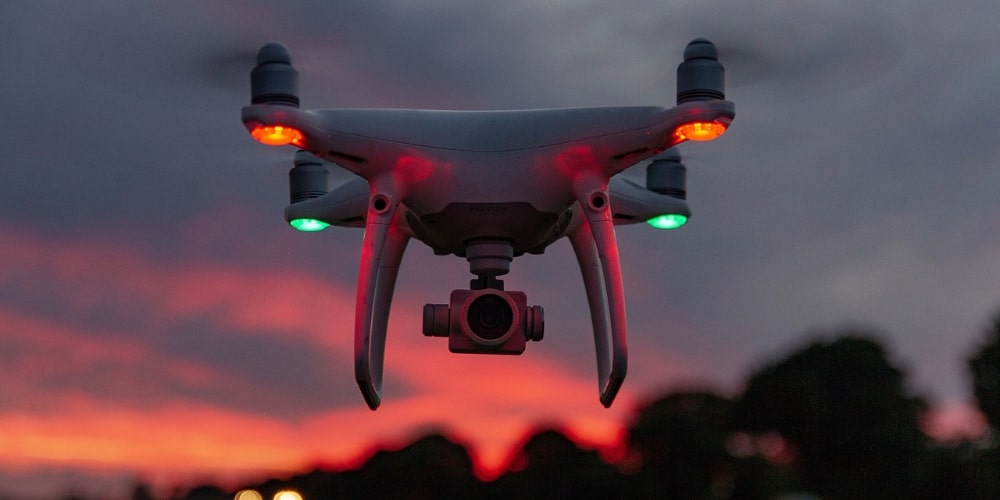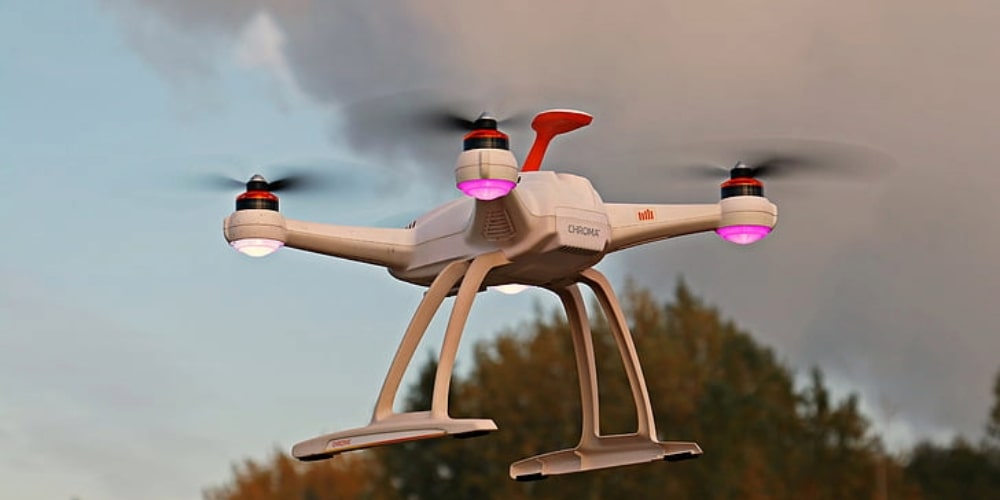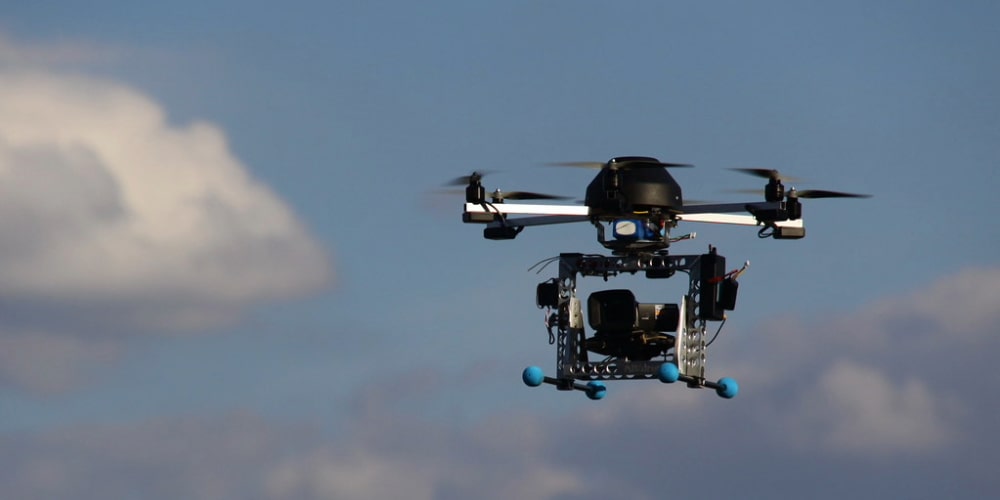A Complete Beginner’s Guide To FPV Drone Racing And Betting
Posted: September 2, 2024
Updated: September 2, 2024
Thanks to their use in Hollywood movies to get incredible shots, drones are now common place at everything from weddings to property marketing. In sport, they are now a every-growing interest, thanks to a number of world-class racing events. Players pit their skills against each other in fast-paced tournaments and league races.

FPV drone racing is a relatively new sport that has taken the world by storm. Unlike traditional races that involve physical movement, drone racing requires pilots to control drones remotely. The first-person view experience, achieved through a camera mounted on the drone, adds a unique and immersive dimension to the competition. Unsurprisingly, and thanks to their increasing use in Hollywood movies, this innovative sport has captured the imagination of enthusiasts and continues to push the boundaries of racing. Even better, you can now enjoy watching drone racing whilst betting on potential winners via the excellent Bet365 Sportsbook platform. With that said, let’s have a deep dive into all aspects of FPV drone racing to see why it’s popularity is growing so quickly, as well as where to bet on upcoming FPV drone racing league events.
What Is FPV Drone Racing?
First-person view (FPV) drone racing has emerged as a thrilling and innovative competitive sport. Unlike traditional racing events that involve physical movement, drone racing requires pilots to control small, unmanned aerial vehicles (UAVs) remotely. The pilot remains grounded, but a headset provides a real-time video feed from the drone’s camera, creating a first-person perspective that immerses the pilot in the race. This unique combination of technology and skill has captivated enthusiasts worldwide.
The courses for FPV drone racing competitions are meticulously designed to challenge your abilities. These courses often incorporate intricate obstacles, tight turns, and unexpected elements, demanding precision, quick reflexes, and strategic thinking. The three-dimensional nature of the courses allows you to navigate around, under, over, and even through obstacles, adding an extra layer of complexity and excitement to the competition.
The popularity of FPV drone racing has surged in recent years, mirroring the broader growth in drone technology. While drones have found widespread applications in various sectors, including commercial, scientific, and humanitarian pursuits, recreational drone flying has also gained significant traction. FPV drone racing represents a dynamic and engaging extension of this recreational trend, offering pilots a competitive outlet to showcase their skills and passion for aviation.
FPV Drone Racing Organisations
The popularity of FPV drone racing has led to the establishment of numerous dedicated organisations and competitions. These organisations now play a crucial role in promoting fair play, setting standards, and fostering a competitive environment for drone racing enthusiasts.

By developing rules and regulations, these organisations ensure that FPV drone races are conducted equitably, allowing pilots to showcase their skills on a level playing field.
MultiGP – The World’s Premier FPV Drone Racing League
MultiGP, the largest professional FPV drone racing league globally, has fostered a thriving community of enthusiasts worldwide. The organisation boasts an extensive network of chapters, each offering a variety of competitive and casual events. With over 30,000 registered pilots and 500 active chapters, MultiGP has created a vibrant and inclusive space for drone racing enthusiasts. MultiGP’s commitment to nurturing its chapters is evident in the comprehensive support it provides. By offering tools, guidance, and community resources, the organisation empowers chapters to create engaging and rewarding experiences for pilots and spectators alike. This structure ensures that drone racing events are well-organised, enjoyable, and accessible to pilots of all skill levels.
MultiGP’s unique approach to chapter management allows for individual expression and creativity. While the organisation provides invaluable resources and solutions, it also emphasises the importance of maintaining chapter identity. This balance lets chapters tailor their events to their specific needs and preferences, fostering a sense of ownership and community. One of MultiGP’s standout features is its proprietary software, designed to streamline race organisation and management. This software assigns racing slots and video frequencies in real time, making it easier for pilots to check in and for event directors to manage the race flow. Additionally, MultiGP has developed standardised racing gates that are easy to transport and set up, ensuring consistency across chapters. These features contribute to a smoother and more efficient race experience for all involved.
The Drone Racing League – A High-Speed, High-Tech Spectacle
The Drone Racing League (DRL) is a premier international competition that showcases the thrilling world of FPV drone racing. Pilots compete on custom-built drones capable of reaching speeds exceeding 80 mph, navigating through intricate and challenging courses both virtually and physically. DRL seamlessly blends the digital and real worlds, delivering cutting-edge drone technology, immersive content, and visually stunning races to audiences around the globe. The DRL Simulator, a virtual training tool, offers a realistic and accessible way for aspiring pilots to learn the fundamentals of drone racing. Through engaging training missions, players can quickly progress from novice to skilled pilot. The simulator also features digital replicas of DRL race courses and drones, allowing pilots to practise on the same tracks and equipment as the professionals. Notably, many of the world’s top drone pilots use the DRL Simulator to hone their skills.
Whether you’re a beginner or an experienced racer, the DRL Simulator provides a valuable platform for learning and practising. It offers a variety of training modes, including virtual race courses that challenge pilots’ abilities. Additionally, the simulator features a public leaderboard, allowing users to track their progress and compete against others. The DRL Simulator is available on popular gaming platforms, making it easily accessible to a wide range of users. DRL’s commitment to accessibility and engagement extends beyond its simulator. According to online gambling news in the US, the league prioritises streaming and televising races on major networks like NBC, Fox Sports, Sky Sports, and even Twitter. This ensures that audiences can easily tune in and experience the excitement of drone racing. Furthermore, DRL offers you the unique opportunity to watch races from the pilots’ first-person perspective, providing an immersive and thrilling experience, especially whilst placing bets on events.
The Fédération Aéronautique Internationale – A Global Force in Air Sports
Founded in 1905, the Fédération Aéronautique Internationale (FAI) serves as the governing body for air sports worldwide. As a non-governmental and non-profit organisation, FAI is dedicated to promoting aeronautical and astronautical activities, ratifying records, and coordinating international competitions. Recognized by the International Olympic Committee (IOC), FAI has grown steadily over the past century, now encompassing a network of over 90 member organisations representing air sports enthusiasts across the globe.
FAI’s activities extend to various aspects of air sports, including the establishment of rules for record certification and competition organisation. The organisation promotes skill, proficiency, and safety in aeronautics, recognizing achievements with medals, diplomas, and awards. FAI also plays a vital role in fostering camaraderie and cooperation among air sports enthusiasts worldwide, uniting individuals who share a passion for activities such as gliding, parachuting, ballooning, microlight flying, and aerobatics.
To ensure the effective management and development of air sports, FAI has established International Commissions for each specific discipline. These commissions are responsible for formulating competition rules, overseeing activities, and providing guidance to member organisations. Through the collaborative efforts of these commissions and FAI’s global network, air sports events and record-setting endeavours are conducted with consistency and adherence to established standards.
FPV Drone Racing Competitions
- FAI World Drone Racing Championship (WDRC) – The FAI World Drone Racing Championship (WDRC) is the pinnacle of drone racing competitions, attracting the world’s top pilots. The 2024 edition will be held in Hangzhou, China, from October 31 to November 3.
- FAI Drone Racing World Cup – The FAI Drone Racing World Cup returned triumphantly in 2022, with MinJae Kim from Korea clinching the title. In 2023, French pilot Killian Rousseau emerged as the champion. The 2024 World Cup promises to deliver exciting and competitive races.
- The World Games – Drone racing will be featured once again at The World Games, the 12th edition of which will take place in Chengdu, China, from August 7 to 17, 2025.
- E-Drone Racing – The FAI E-Drone Racing World Cup series was launched in 2024 to introduce newcomers and gamers to the world of drone racing. This online version of the sport is accessible to a wide audience, allowing participants to compete from anywhere in the world.
- Drone Soccer – Drone Soccer is gaining popularity, with new competition formats being developed in various countries. The sport was officially recognized by the FAI in 2019, leading to the first FAI Open International tournament in 2023. Several more international tournaments are scheduled for 2024.
Current And Upcoming FPV Drone Racing Events
FAI WORLD AND CONTINENTAL CHAMPIONSHIPS (CAT.1)
- 2024 FAI World Drone Racing Championship – 31 Oct-03 Nov 2024, Hangzhou, CHN
OTHER FAI-SANCTIONED EVENTS (CAT.2)
- 2024 VII Trofeo Secchia F9U – 07 Sep-08 Sep 2024, Modena, ITA
- 2024 Phoenix Drone Racing – 14 Sep-15 Sep 2024, Prilep, MKD
- 2024 Gaelic GP – 20 Sep-21 Sep 2024, Madrid, ESP
- 2024 Türkiye Drone Race – 28 Sep-29 Sep 2024, Istanbul, TUR
- 2024 Namwon World Drone Racing Masters – 04 Oct-06 Oct 2024, NamWon-city, KOR
- 2024 ASFC F9U World Cup Chongqing, China – 24 Oct-27 Oct 2024, Chongqing, CHN
- 2024 Riyadh Drone Racing World Cup – 14 Nov-16 Nov 2024, Riyadh, KSA
- FAI Hong Kong Open Drone Racing Championship – 16 Nov-2024, Hong Kong, HKG
- 2024 Asian Indoor and Martial Arts Games (Indoor Demonstration FPV Racing) – 25 Nov-28 Nov 2024, Pathum Thani, THA
The Appeal Of FPV Drone Racing
Drone racing has emerged as a captivating sport, attracting enthusiasts worldwide. The combination of speed, skill, and technological innovation makes it an exhilarating pursuit. Piloting a high-performance drone through intricate obstacle courses at breakneck speeds offers an adrenaline-pumping experience that is both challenging and rewarding. The precision and reflexes required to navigate these courses demand a high level of skill and dedication.
Beyond the thrill of competition, drone racing offers participants a unique opportunity to engage with technology and develop valuable skills. The sport requires a deep understanding of drone mechanics, aerodynamics, and flight control systems. Participants must also possess excellent spatial awareness and hand-eye coordination. These skills are not only beneficial for drone racing but can also be applied to other fields, such as engineering, robotics, and even video production.
Affordability
One of the factors contributing to the popularity of drone racing is its affordability. Unlike many other sports, drone racing can be relatively inexpensive to participate in.

The necessary equipment, including a video camera, video transmitter, immersive video goggles, and a remote control, can be obtained at a reasonable cost. This accessibility has made drone racing a viable option for a wide range of individuals.
Safety
Another significant factor contributing to the appeal of drone racing is its safety. Compared to traditional motorsports, drone racing involves minimal risk to human life. While drones can travel at high speeds, the presence of obstacles and the controlled environment of race courses significantly reduce the likelihood of accidents. Additionally, the relatively small size of drones minimises the potential for serious injuries in the event of a collision. These safety considerations make drone racing a more accessible and less risky sport compared to many others.
How Much Does An FPV Drone Cost?
If you’re considering getting into FPV drone racing, one of the first questions you’ll likely ask is, “How much does it cost?” The answer depends on several factors, including your experience level and the specific components you choose.
Building Your Own FPV Drone – A DIY Guide
For enthusiasts seeking complete control over their drone’s capabilities, building a DIY FPV drone offers the highest level of customization. However, costs can vary significantly depending on the components you choose. Here’s a breakdown of estimated costs:
- Radio controller + Simulator: $100-$300
- FPV Goggles: $100-$700
- FPV Drone: $100-$400
- Batteries, charger, and other accessories: $100-$400
Total Cost: $400-$1,800
Choosing Pre-Built Drones
If you prefer to spend more time flying and less on assembly, a pre-built drone might be a better option. Keep in mind that pre-built drones can be more expensive, especially if they are highly customizable. Additionally, you may need to learn soldering to repair any damage.
Other Key Components And Considerations
- FPV Goggles: Essential for viewing the drone’s live video feed. Prices range from $100 to $700.
- Maintenance and Repair: Damage is inevitable, so budget for repairs and replacements. Regular maintenance can prolong the drone’s lifespan.
- Upgrades: Consider upgrading with accessories like FPV goggles, cameras, or lenses to enhance performance. However, assess whether the upgrade will significantly improve your flight experience before making a purchase.
Key Factors Affecting Cost
- Drone Frame: The frame is the foundation of your drone. Prices can range from a few hundred dollars to several thousand, depending on the material, size, and features.
- Motors and ESCs: The motors and electronic speed controllers (ESCs) determine the drone’s power and speed. Higher-quality components will be more expensive.
- Propellers: Propellers come in various sizes and materials. The choice of propellers can affect the drone’s performance and cost.
- Flight Controller: The flight controller is the brain of the drone, responsible for controlling its movements. Prices vary based on features and capabilities.
- Video Transmitter: The video transmitter sends a live video feed from the drone to your headset. Higher-quality transmitters offer better range and video quality.
- Video Receiver and Headset: These components receive the video signal and display it to the pilot. The cost can vary depending on the desired features and quality.
- Battery: The battery’s capacity and type will affect the drone’s flight time and cost.
RTF FPV Drone Kits – A Beginner’s Choice
Ready-to-Fly (RTF) kits offer a convenient starting point for new FPV drone enthusiasts. These kits typically include the drone, radio, receiver, battery, and charger, and often come with FPV goggles. This all-in-one package eliminates the need for additional purchases, providing peace of mind for beginners.

- Budget-Friendly Options – For those on a tight budget, basic RTF kits can be found for as low as $200. These kits are ideal for learning the fundamentals of drone flying.
- Mid-Range Options – For a more advanced experience, consider RTF drones priced between $300 and $500. These models often have stronger construction, better cameras, and additional features.
- Pre-Built Quads – Once you’ve mastered the basics, pre-built quads can be a good option. These drones typically don’t include a radio or goggles, allowing you to customise your setup. Prices for pre-built quads range from $300 to $600 for reliable models with various features. High-performance models with advanced features and exceptional photography capabilities can cost $600 and above.
Betting On Drone Racing
In spite of there being so many top online sportsbook sites in the US, many have yet to recognise the potential of allowing bettors to enjoy a flutter on FPV drone racing. However, our favourite drone racing sports betting platform, Bet365 Sportsbook offers wagering on FPV drone racing. One point worth keeping in mind if you’re chasing large profits is that, unlike more common sports activities like soccer or horse racing, the maximum winnings from betting on drone racing are capped at $25,000. With that being said, it’s worth keeping in mind the massive number of bonuses and incentives on offer from top sportsbooks when betting in drone racing leagues. These can make a huge difference to your bankroll, in many cases instantly doubling the amount of funds you have to bet with.
The Future Of FPV Drone Racing – A Bright Outlook
Though the future of FPV drone racing as a new sport remains uncertain, the sport’s rapid growth over the past decade suggests a promising trajectory. Significant investments from major corporations, such as T-Mobile’s partnership with the Drone Racing League (DRL), indicate a strong belief in the sport’s potential. T-Mobile’s investment aims to fuel innovation in both drone technology and tech-powered sports. With 5G technology, the league can expect enhanced connectivity and data capabilities, leading to more immersive and exciting races. The involvement of major corporations in drone racing demonstrates the sport’s growing popularity. The accessibility and safety of drone racing, combined with low barriers to entry, make it attractive to a wide audience. Here at Gamingzion.com, we believe that as the sport continues to evolve and gain momentum, it is likely to attract even more enthusiasts, investors, and bettors, thus ensuring a bright future for FPV drone racing.
Click here to try the best odds at bet365 Sportsbook












